San Jose, Costa Rica: 2025 Business Aviation Destination Guide
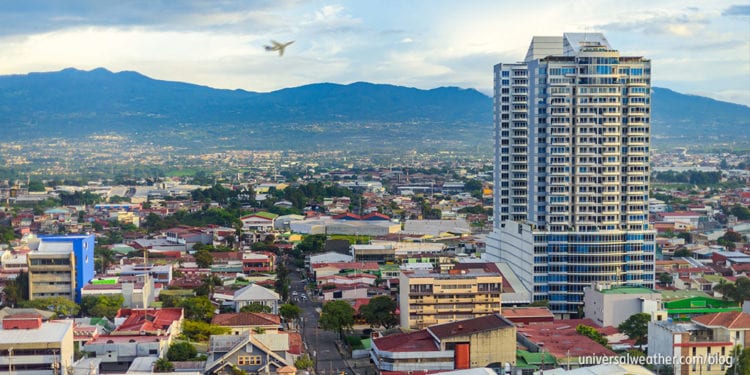
For business aircraft operators, setting up a flight to San Jose (SJO/MROC) is not a difficult proposition, and there’s nothing onerous from the regulatory perspective. With the opening of Costa Rica’s first-ever general aviation terminal in December 2019, the experience and security for business aviation operators is now significantly enhanced. It’s essential to work with your trip support provider and the local ground handler in advance to understand all documentation and prior permission required (PPR) lead-time considerations.
Here is what you need to know when operating to MROC:
Airport Information
MROC is the main airport for San Jose and is located in Alajuela, about 19 kilometers (km) (12 miles) outside San Jose. Drive time to the San Jose city center ranges from 30 minutes to more than one hour, depending on traffic. Peak hours for road traffic congestion are 0600-0800 and 1600-1800 local, and these periods should be avoided. Be aware that there are few options available for helicopter transfers within the country, due to lack of helicopters in the country.
The airport is open 24/7. Check Feasibility-IQ for any NOTAMs and potential closures.
Slots
Airport slots are not usually required in Costa Rica for private non-revenue and charter (non-scheduled commercial) GA operations. Costa Rican Civil Aviation Authority (CAA) views both private non-revenue and charter flights as GA and makes no distinction between the two. Only scheduled commercial airlines require airport slots for Costa Rica. The exception is that during high-traffic events, airport slots may be implemented for GA, but this is very rare.
PPR
A PPR for MROC is required for all arrivals/departures, including tech stops, with minimum 48 hours’ advance notification. The exception is medevac flights, as they do not require a PPR. PPR requests should be submitted by a local ground handler, like Universal Aviation Costa Rica, as a specific request format is used to submit it to the airport authorities.
The primary reason for a PPR at this location is due to aircraft parking limitations. Short-notice PPR requests are often entertained but will depend on aircraft parking availability.
Once the PPR is approved, you will receive a confirmation ID, which will be your tail number and date of operation. Confirmation reference does not need to be placed in flight planning remarks. For a delayed arrival, your ground handler will need to advise airport authorities for aircraft parking availability to be reconfirmed.
Aircraft Parking
GA parking is relatively limited at all AOEs in Costa Rica. MROC has only eight GA parking spots. Hangar facilities are not available for transient business aviation operations at MROC. There are options for hangar spaces at MRPV (Pavas) but aircraft reposition will be required
Late November to early April is the high season and when overnight parking often becomes unavailable. During busy periods MROC will issue NOTAMs barring overnight parking for GA. Be aware that you’ll still require parking permission to drop off/pick up passengers. At this time there are no plans to increase GA parking capacity, and remote parking areas are reserved for scheduled commercial aviation.
There have been cases at MROC where parking has been denied after it’s been approved. This may happen during a high-traffic event period, such as a presidential election. Airport authorities make these decisions, and ground handlers are unable to control this.
There may be cases where you’ll need to drop passengers and reposition aircraft/crew elsewhere in the country or outside Costa Rica.
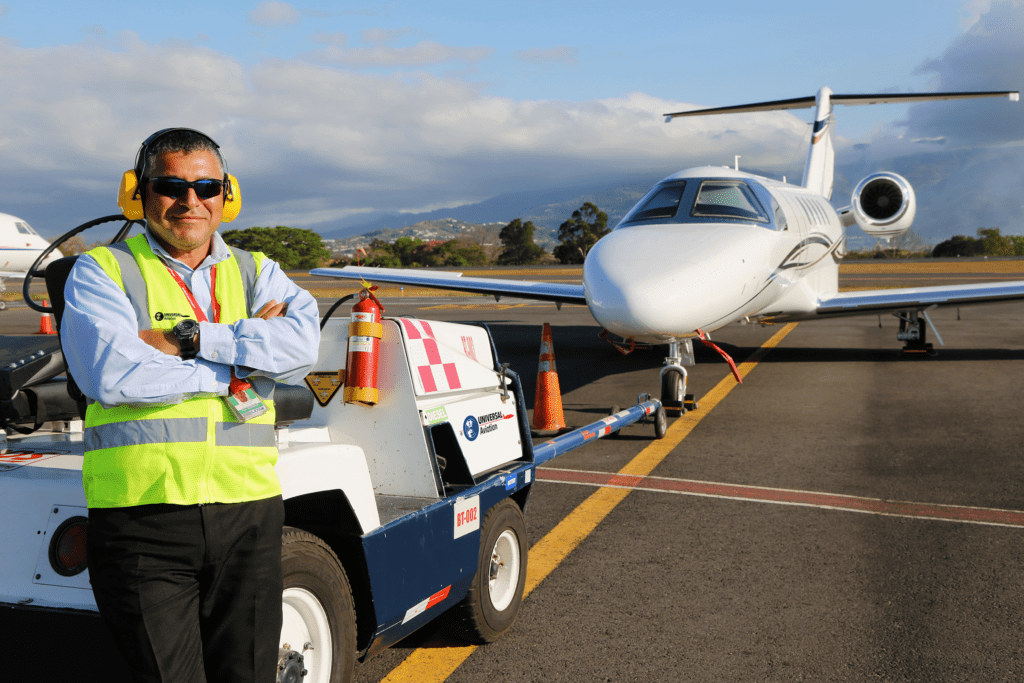
FBOs and Ground Handling
The Ground Handling Process
Ground handling quality is high at major airports, and most services are readily available. A full schedule – along with aircraft, crew, and passenger information – is needed to set up ground handling in Costa Rica. You should itemize required services – such as catering and lav/water service – at the time a ground handling request is made. The ground handler will use your itinerary to obtain parking. Be aware that standard aircraft documentation – including airworthiness and registration certificates and worldwide insurance – must be onboard and available, upon request by airport authorities, when you land.
At least 48 hours’ notice is recommended when requesting ground handling at MROC. Authorities may impose restrictions, however, on short-notice operations. Air ambulance flights are always permitted to operate on short notice.
Once a handling request is received, your ground handler contacts the airport operations department – usually via email, but occasionally by phone – to coordinate a parking permit. Meanwhile, other required services – such as fuel, lav/water, and catering – will be coordinated by your handler. A parking confirmation number will be provided by airport authorities. This confirmation number is the tail number plus the date of operation (e.g., NXXXdatemonth). It’s not necessary to place this confirmation in the remarks section of your flight plan. Be aware that your actual parking spot location will not be provided until the day of arrival. All airport and 4th-party service charges may be settled on credit with advance notice to your ground handler.
Recommended Ground Handler
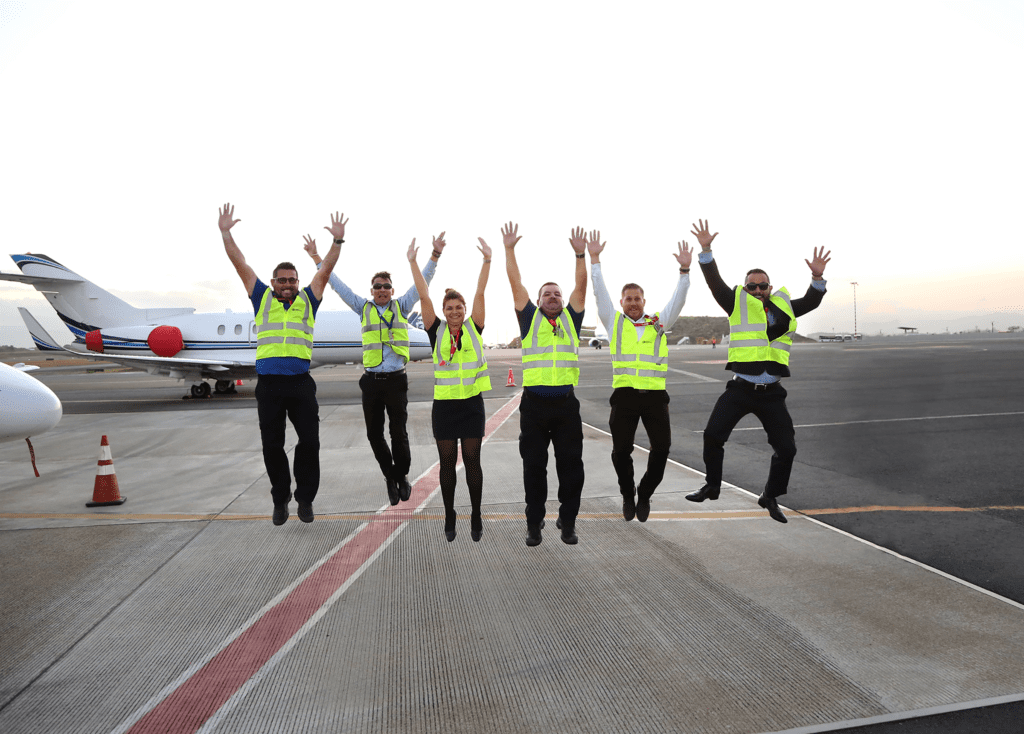
Universal Aviation Costa Rica is our recommended ground handler for any destination in Costa Rica and holds IS-BAH accreditation.
General Aviation Terminal
In December 2019, Costa Rica’s first-ever GAT, exclusively available to international private operations, opened. The new GAT, which operates under the name GAT SJO General Aviation Terminal, is managed by GAT SJO, a consortium composed of Universal Aviation Costa Rica and local partners.
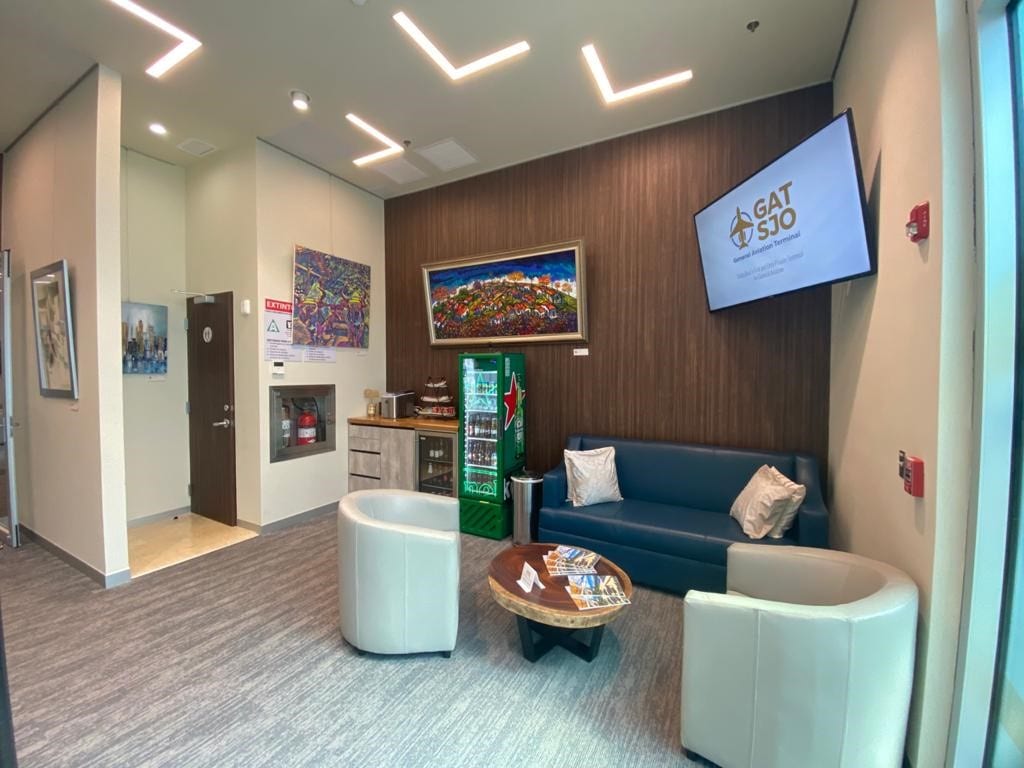
All private aviation ground handlers, as well as home-based operators (independent owners traveling internationally) at MROC, will be allowed to operate through GAT SJO General Aviation Terminal.
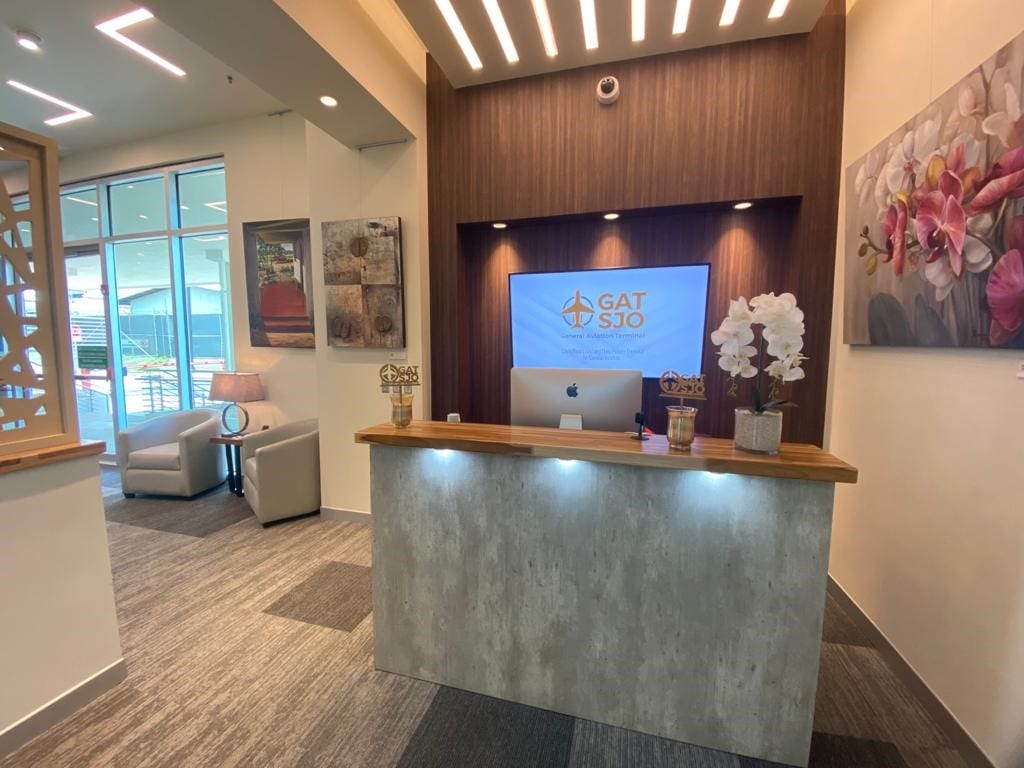
The facility provides exclusive areas and private service to crews and passengers.
The GAT is part of a new domestic terminal at MROC, an infrastructure project which includes 15,260 square-feet. Some of the features and benefits of the GAT include:
- Exclusive VIP experience for private operators, including beautiful, comfortable areas at departure and arrivals, to enjoy premium Costa Rican coffee
- Onsite Customs, Immigration, and Quarantine (CIQ)
- Reduced ground time from plane to car
- No co-mingling with commercial passengers
- Roof-covered access both roadside and rampside
Upon deplaning, private passengers will be shuttled by their handling agents from the parking area to the GAT, which will have a dedicated area for CIQ. All private aviation ground handlers, as well as home-based operators (independent owners traveling internationally) at MROC, will be allowed to operate through GAT SJO General Aviation Terminal.
There will be a charge per operation (according to the MTOW) and a charge per passenger. Operators are not required to use the GAT and may use the main terminal if they prefer to be co-mingled with commercial passengers for all the terminal processes, which a majority of business aviation fliers will not. The airport’s procedure will not guarantee the preferential line at the commercial terminal. Private aviation passengers may be stuck behind the line of commercial passengers.
Fast Track Service
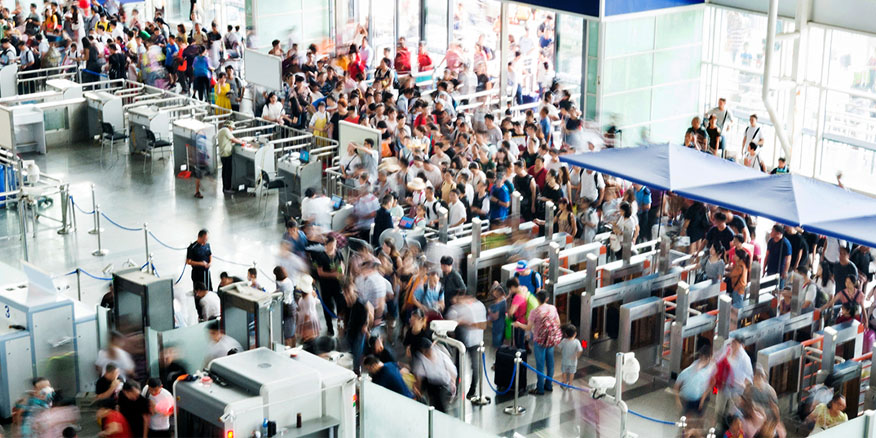
In August 2024, Costa Rica’s Juan Santamaría International Airport (SJO) began offering a Fast Track service for commercial passengers, previously available only to private aviation clients. This service, provided by Universal Aviation Costa Rica, allows travelers to bypass long Customs, Immigration, and Quarantine (CIQ) lines, potentially saving up to two hours per flight. For $75 per person (children under 12 free), passengers receive a personal guide, luggage assistance, and VIP lounge access for departures. The service is particularly valuable for large groups, corporate teams, and families. Operators should consider factors like peak travel seasons and group composition when deciding whether to recommend Fast Track to their clients.
Equipment
Ground handlers at MROC have a good supply of ground support equipment (GSE) and are usually able to rent any required additional equipment from other providers at the airport. It is recommended to review and confirm any GSE requirements with your ground handler before the day of operation.

Hotels
Hotels in Costa Rica are generally of high standards, and business aircraft operators will typically have plenty of options to consider. Be aware, however, that during high-traffic seasons, preferred accommodations are often scarce and will be challenging to secure last minute.
There are many hotel choices in Costa Rica for crew accommodation. Most 4- and 5-star options are located in the San Jose and Liberia areas. These include many large international hotel chains. It’s recommended that crew members stay at 4-star and above hotels. If these are not available, there are also good 3-star accommodation options in Costa Rica. It’s recommended that you communicate with your ground handler for recommendations and the best possible options.
Ground Transportation
Transportation vendors, in some special circumstances, can obtain permission to pick up/drop off passengers’ planeside. This is usually only possible for certain qualifying VIP flights. Your ground handler will advise you on available options. In cases of diplomatic and head-of-state flights, local ground handlers will service the aircraft; however, aircraft parking, CIQ clearance, and planeside pickup arrangements will be coordinated by airport and government authorities. Rental vehicles are available on-airport at MROC.
A car and driver are recommended for local transport. You should request an English-speaking driver (or a driver who speaks your language). A selection of vehicle types is usually available. During high season, however, there’s a more limited selection of available vehicle types. Public taxis are not recommended in Costa Rica due to language barriers.
Fuel
When operating to Costa Rica, it’s best to preplan aviation fuel uplifts well in advance, particularly during high season (end of November though the end of March). If you’re planning to depart during peak operating hours, it’s recommended to fuel on arrival or land with sufficient fuel to manage your next planned leg. Universal Aviation team is working with RECOPE the local provider in order to have dedicated trucks for GA during High Season.
There’s only one aviation fueler in Costa Rica, and it’s owned by the government. For fuel uplift requests, your ground handler will email the fueler (in Spanish) with your schedule, aircraft information, and operator information. The fueling company only accepts selected aviation fuel cards and certain consumer credit cards. Cash is never accepted. While fuel is regularly tested at all airports, the crew may request additional fuel testing prior to uplift. This request must be made in Spanish, and it’s best to have your ground handler involved.
Hydrant fuel is available at San Jose (MROC) and only on the commercial side. MROC has seven-to-eight fuel trucks, and sometimes there’s not enough manpower available for all the trucks. By regulation, scheduled commercial operations have priority over general aviation for fueling.
Aviation fuel uplifts in Costa Rica, particularly for tech stops, are often accomplished very quickly. There are times, however, when significant fuel delays can occur, depending on arrival time, season, day of arrival, and aircraft type. During the high season – particularly during peak hours of 1300-1600 local – fuel uplift delays may be as long as several hours. If you’re operating to Costa Rica during high season, it’s best to schedule fuel uplifts outside the hours of 1300-1600 local.
Catering
There’s only one in-flight catering company approved by the government of Costa Rica. A catering menu is available for GA, but operators may request items off-menu. While Costa Rica has a wide range of produce, meat, fish, and wine available, some items, such as Kosher foods, may be difficult to source. It’s best to provide 24-48 hours’ lead time for in-flight catering requests. Note that your ability to source catering directly from restaurants/hotels may be limited. If you attempt to bring “unofficial” catering to the airport, there’s a possibility you’ll not be permitted to take it airside. As some airports are stricter than others in terms of self-catering from off-airport facilities, it’s important to review available options with your ground handler. Due to language barriers, in-flight catering requests are usually given to the ground handler, who relays them to the in-flight caterer.

Security
MROC has airport security controlled by local law enforcement. MROC has adequate fencing, security camera coverage, and patrols. If you require additional security for your aircraft, unarmed security can be arranged via your ground handler or trip support provider. However, according to AVSEC-FAL, if it’s a large commercial flight private / charter flight additional security is required.
At MROC, all personnel and vendors must have security badges to access the ramp airside. On the day of departure, crew members must have their licenses and crew IDs with them to access the ramp, and they must be escorted by the ground handler. At all AOEs in Costa Rica, a ground handler must accompany crew members any time they’re on the ramp or within any secure area of the airport.
Personal security for passengers and crew members is not usually required in Costa Rica. The only exception is if you’re operating with a well-known celebrity or diplomatic/head of state passenger.
CIQ
MROC is a 24-hour airport with full-time customs, immigration, and quarantine (CIQ). CIQ can now be completed within the new GAT (GAT regular operation hours 0600 LCL thru 2100 LCL) with overtime additional terminal fee. Your ground handler will direct passengers and luggage through customs and later will escort crew and their luggage through the terminal.
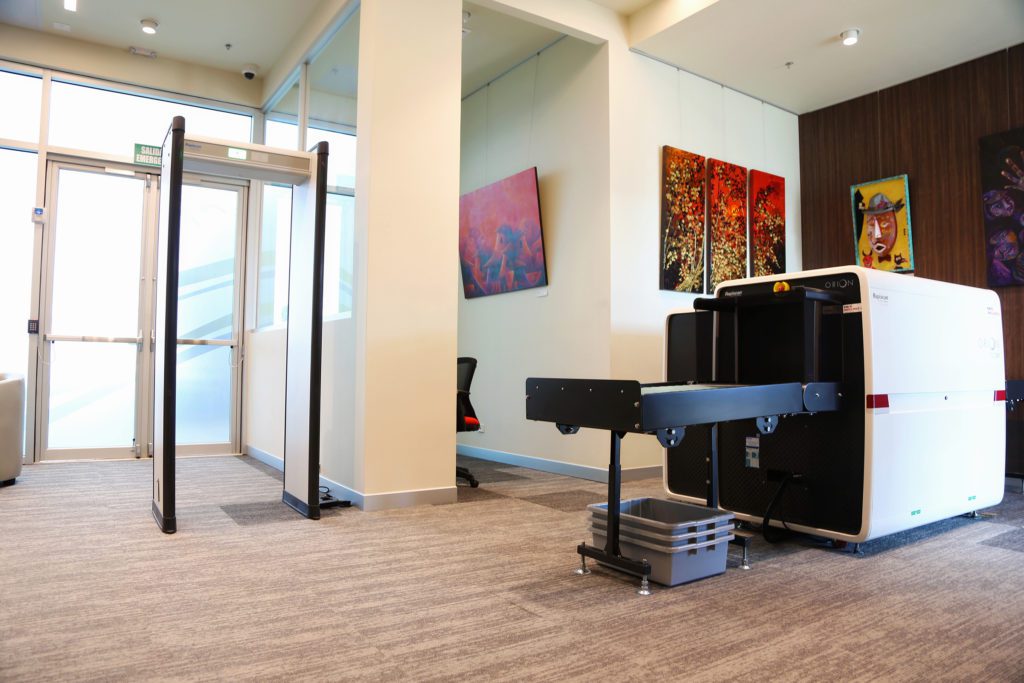
Weather
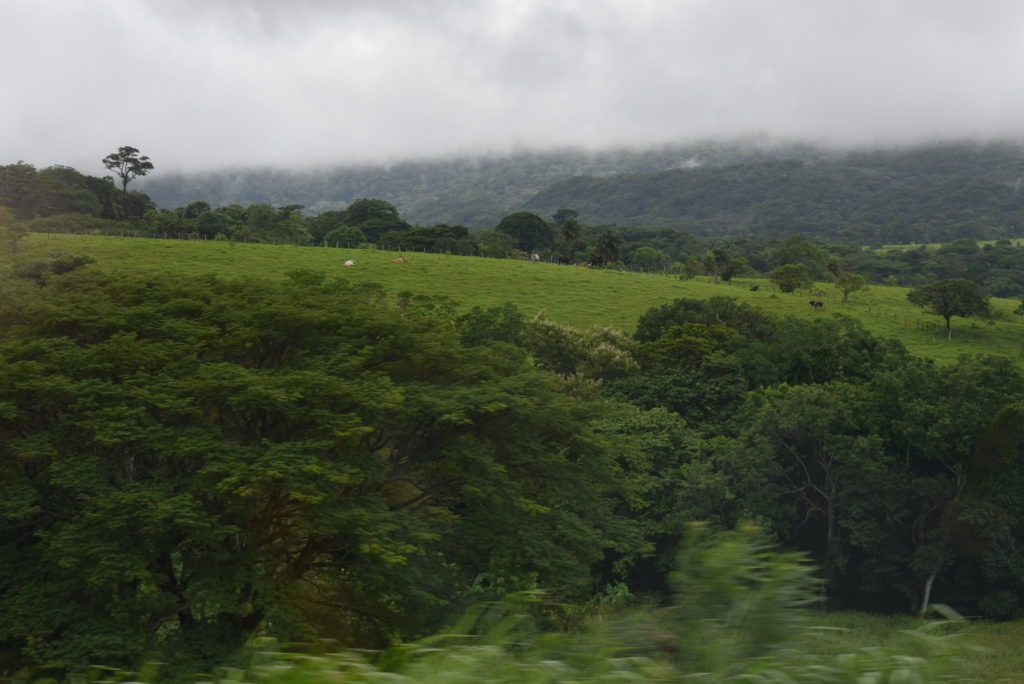 Weather is generally very good during the late November through early April high season. Expect potential for heavy rain during the traditional rainy season: August through November. In certain parts of the country, fog can be an issue. Fog here usually occurs at night but, occasionally, can be an issue during mornings.
Weather is generally very good during the late November through early April high season. Expect potential for heavy rain during the traditional rainy season: August through November. In certain parts of the country, fog can be an issue. Fog here usually occurs at night but, occasionally, can be an issue during mornings.
Tech stops
At least 48 hours’ notice is recommended when requesting ground handling at MROC. Authorities may impose restrictions, however, on short-notice operations. Air ambulance flights are always allowed to operate on short notice.
Passengers and crew members will stay on board the aircraft during refueling. They don’t need to clear CIQ. If passengers and/ crew members for any reason need to go the GAT they must be escorted by the ground handling company employees always and comply with the AIC, airport MOA (airport operations manual), and GAT procedures established by Airport Authorities.
Peak season
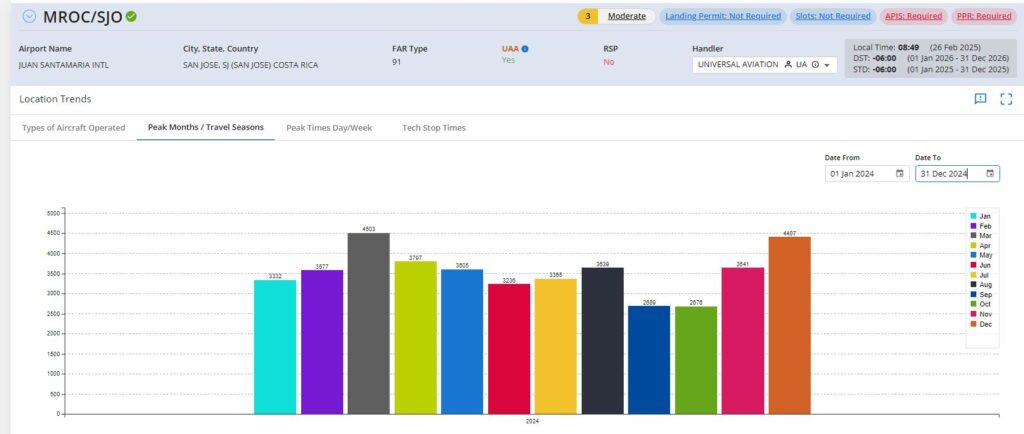
You can view destination insights such as busiest months and travel seasons for popular airports in Coast a Rica in Feasibility-IQ.
During the high season – late November until early April – it’s best to confirm hotel arrangements well in advance due to increased demand. The average price of 4- and 5-star crew accommodations during high season averages 200 USD per night. During the peak of high season, particularly between Christmas and New Year, and when events such as fishing tournaments are in progress, rooms can go as high as 400 USD per night. For stays during high-demand periods, it’s often best to book crew accommodations at least three months in advance.
During peak season, operators should make their aircraft parking requests by early September. You will not, however, know the status of your parking request until November or December, and it’s at the discretion of airport authorities to approve/disapprove such requests. There are typically more parking issues with larger business aircraft, such as Gulfstream G550s and Bombardier Global 6000s.
At MROC, GA parking is separated by MTOW, but this is not the case at other Costa Rican airports. Officially, there are only eight GA parking slots at MROC. At the discretion of airport authorities, however, it may be possible for GA to park on the commercial ramp at MROC. During this period expect delays with aviation fuel uplifts, lav/water services, etc. due to increased activity on the ground and priority being given to scheduled commercial traffic.
Universal Aviation Costa Rica can help
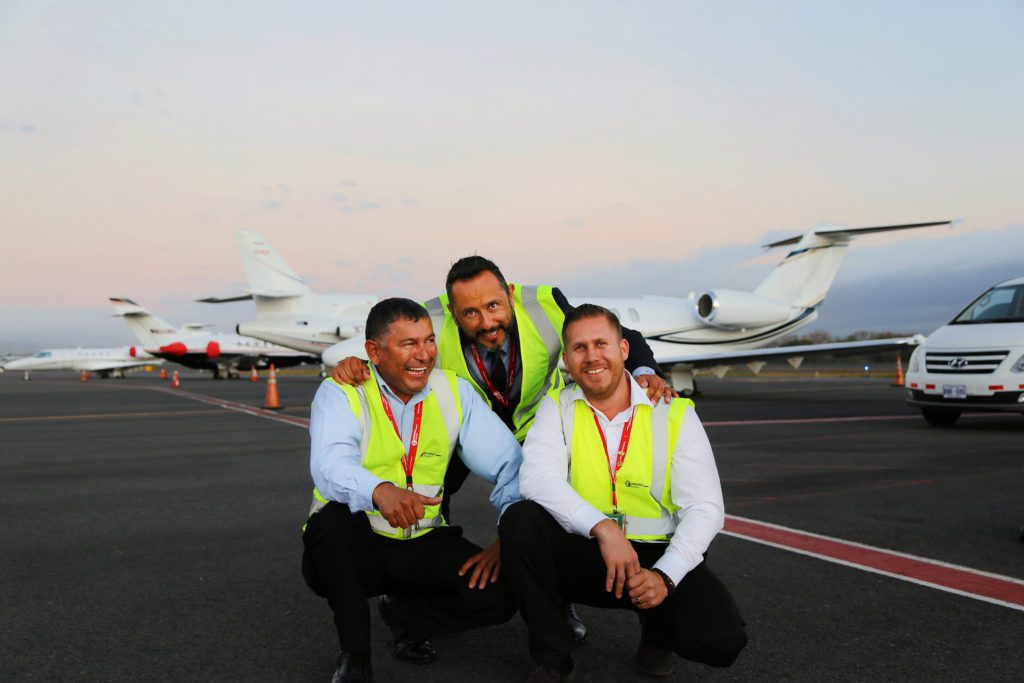
Universal Aviation Costa Rica was voted Best FBO in Latin America in 2021 by ProPilot Magazine readers. We are an IS-BAH Stage II accredited ground handler who operates the country’s first and only general aviation terminal (GAT) located at MROC. Our primary locations are in San Jose and Liberia. More information and team contact info are available on our website.
Helpful links
For more information on customs, agriculture, immigration, and arrival and departure procedures, please see the following links:
Immigration
http://www.migracion.go.cr/eng-index.html
Agriculture
http://www.mag.go.cr/
DGAC AIC
http://www.dgac.go.cr/ais/circulares/ca06_11%20EV.pdf
https://www.dgac.go.cr/wp-content/uploads/2019/06/ca16_18-IGA-PROCEDURES-AIJS.pdf
GAT SJO





